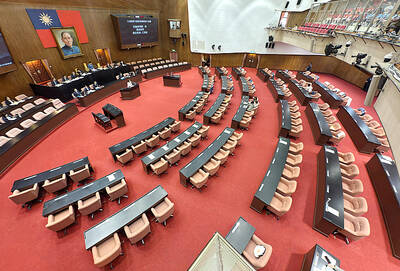Argentina on Wednesday night intensified its diplomatic offensive against Britain’s oil exploration off the Falkland Islands by taking the case to the UN.
Argentinian Foreign Minister Jorge Taiana was due to spell out Buenos Aires’ demands in a meeting in New York with UN Secretary-General Ban Ki-moon just a day after mobilizing Latin American and Caribbean support.
Taiana was expected to press Argentina’s claim of sovereignty over the islands and to demand an immediate cessation of the British drilling for oil and gas that started this week.
He was due to detail “the latest illegitimate and unilateral actions by the UK,” the foreign ministry said in a statement on the eve of the meeting.
The next step would be to table a resolution at the UN general assembly.
The UN has called for talks between Britain and Argentina, but has little power to intervene without the backing of the security council, where the UK would be able to veto substantive resolutions.
Brazilian President Luiz Inacio Lula da Silva added pressure by saying the council was an anachronism tilted in favor of Western powers.
He said: “It is not possible that Argentina is not the owner while England is, despite being 14,000km away.”
He also repeated long-standing complaints that Brazil and other emerging powers should be included as permanent members of the security council.
British officials have privately admitted frustration, but no great surprise, that mainstream Latin leaders have thrown their weight behind Buenos Aires. A spokesman at the British prime minister’s office said drilling would continue.
“It is entirely for the Argentinians if they want to go to the UN,” said Simon Lewis, a spokesman for British Prime Minister Gordon Brown. “We continue to support the right of the Falkland Islands to develop their hydrocarbon sector. Our view is their commercial activity is entirely compatible with good relations with the government of Argentina.”
US President Barack Obama’s administration, which wants to improve US ties with Latin America without alienating Britain, sought to distance itself from the row.
“I think we are neutral on the question of sovereignty,” said Philip Crowley, a spokesman for the US State Department.

CROSS-STRAIT COLLABORATION: The new KMT chairwoman expressed interest in meeting the Chinese president from the start, but she’ll have to pay to get in Beijing allegedly agreed to let Chinese Nationalist Party (KMT) Chairwoman Cheng Li-wun (鄭麗文) meet with Chinese President Xi Jinping (習近平) around the Lunar New Year holiday next year on three conditions, including that the KMT block Taiwan’s arms purchases, a source said yesterday. Cheng has expressed interest in meeting Xi since she won the KMT’s chairmanship election in October. A source, speaking on condition of anonymity, said a consensus on a meeting was allegedly reached after two KMT vice chairmen visited China’s Taiwan Affairs Office Director Song Tao (宋濤) in China last month. Beijing allegedly gave the KMT three conditions it had to

‘BALANCE OF POWER’: Hegseth said that the US did not want to ‘strangle’ China, but to ensure that none of Washington’s allies would be vulnerable to military aggression Washington has no intention of changing the “status quo” in the Taiwan Strait, US Secretary of Defense Pete Hegseth said on Saturday, adding that one of the US military’s main priorities is to deter China “through strength, not through confrontation.” Speaking at the annual Reagan National Defense Forum in Simi Valley, California, Hegseth outlined the US Department of Defense’s priorities under US President Donald Trump. “First, defending the US homeland and our hemisphere. Second, deterring China through strength, not confrontation. Third, increased burden sharing for us, allies and partners. And fourth, supercharging the US defense industrial base,” he said. US-China relations under

The Chien Feng IV (勁蜂, Mighty Hornet) loitering munition is on track to enter flight tests next month in connection with potential adoption by Taiwanese and US armed forces, a government source said yesterday. The kamikaze drone, which boasts a range of 1,000km, debuted at the Taipei Aerospace and Defense Technology Exhibition in September, the official said on condition of anonymity. The Chungshan Institute of Science and Technology and US-based Kratos Defense jointly developed the platform by leveraging the engine and airframe of the latter’s MQM-178 Firejet target drone, they said. The uncrewed aerial vehicle is designed to utilize an artificial intelligence computer

The Chinese Nationalist Party (KMT) caucus yesterday decided to shelve proposed legislation that would give elected officials full control over their stipends, saying it would wait for a consensus to be reached before acting. KMT Legislator Chen Yu-jen (陳玉珍) last week proposed amendments to the Organic Act of the Legislative Yuan (立法院組織法) and the Regulations on Allowances for Elected Representatives and Subsidies for Village Chiefs (地方民意代表費用支給及村里長事務補助費補助條例), which would give legislators and councilors the freedom to use their allowances without providing invoices for reimbursement. The proposal immediately drew criticism, amid reports that several legislators face possible charges of embezzling fees intended to pay